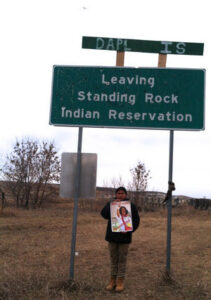Native Waters, Native Warriors: From Standing Rock to Honduras
Around the globe, land has become gold-standard currency. As a result, Indigenous and other land-based peoples face threats to the natural commons on which they live, produce food and sustain community, culture and cosmovision.
In some places, organized Indigenous movements have stood up and fought off extraction and corporate development, winning protection of waters, forests, territories and more. In most places, the resistance has been met with assassination and violent repression by state security forces and corporate-financed hit squads.
Two of the fiercest Native battles in the Americas today are closely connected. They are led by the Standing Rock Sioux in North Dakota and by the Lenca people in Honduras, organized through the Civic Council of Popular and Indigenous Organizations of Honduras (COPINH)*. Both are hard at work defending their territories and waters from further theft and desecration: At Standing Rock they are struggling against an oil pipeline being laid under their ancestral Missouri River, which they use for ceremony, drinking water and sustaining other life; on Lenca lands they are resisting the damming of their ancestral Gualcarque and other rivers.
In both cases, the movements face enormous stakes. And they both know that, as Howard Zinn said, “The power of the people on top depends on the obedience of the people below.” So they are challenging the power on top with shared strategies of mass mobilization and direct action. They both have the capacity to inspire the world, as seen by an outpouring of active solidarity with their uprisings from around the globe.

Each is enduring tremendous assault. Standing Rock Water Protectors have suffered dog attacks, water cannons in sub-freezing temperatures, rubber bullets and tear gas. Twenty-one-year-old activist Sophia Wilansky risks amputation of her arm after being hit by what witnesses claim was a concussion grenade. Vanessa Dundon may lose permanent sight in one eye after being hit with a tear gas canister. Red Fawn Fallis is in prison, facing a trumped-up federal charge. More than 500 others have been arrested.
COPINH founder and leader Berta Cáceres was slain this past March by the Honduran government and an internationally financed dam company, with at least implicit backing from the US government, which funds the Honduran military. More than 90 additional COPINH members have been killed, and another 90 or so permanently injured, over the group’s 23-year history, according to Lenca Indigenous coordinator Tomás Gomez. Gomez himself has survived three assassination attempts and been beaten by soldiers twice since March.
The Standing Rock Sioux and the Lenca, moreover, each claim one of the greatest leaders for Native autonomy and territory in their country. Sitting Bull (c. 1831-90) and Lempira (d. 1537) were powerful spiritual and military leaders who fought back conquest by Americans and Spanish, respectively.
On the gentle North Dakotan hills — recently covered with yellow-brown grasses, now buried in white snow — where thousands of Water Protectors are convened, we talked with Native people about their counterparts in Honduras. Some knew about COPINH and especially about Berta Cáceres. All felt their lives, stories and fates reflected in their Honduran counterparts.
Nathan is from Nebraska, though now Standing Rock is his only home. He is a Native children’s advocate and works at the school for the children living in the camp. When asked if he would like to be photographed holding a poster of Berta Cáceres, he said, “Oh, Berta! That would be a blessing. We love Berta!”
To help those on the front lines turn the tide, we must all stand with Standing Rock. December is Global Month of #NoDAPL Action. Call banks that have invested in the Dakota Access pipeline and urge them to pull their funds. Almost $18 million have already been divested from the project. Look for more ways to lend support here.
The best way to turn the tide in Honduras is to cut US military aid to the government, which runs the most dangerous country in the world in which to be an environmental defender. Work for the passage of the Berta Cáceres Human Rights Act, which will be reintroduced in the new US Congress in January. Keep up-to-date here.
Berta Cáceres loved to say, “They fear us because we’re fearless.” With so much at stake for humanity and Mother Earth, it’s time for us all to follow the lead of those in Standing Rock and Honduras, and stand, resist and act fearlessly.
Copyright, Truthout. May not be reprinted without permission.
Beverly Bell has worked for more than three decades as an advocate, organizer and writer in collaboration with social movements in Latin America, the Caribbean, Africa and the US. Her focus areas are just economies, democratic participation and gender justice. Beverly currently serves as associate fellow at the Institute for Policy Studies and coordinator of Other Worlds. She is author of Walking on Fire: Haitian Women’s Stories of Survival and Resistance and of Fault Lines: Views Across Haiti’s Divide. She is also a member of Truthout’s Board of Advisers.
* Grassroots International has provided financial support and political solidarity to both the Civic Council of Popular and Indigenous Organizations of Honduras (COPINH), and to the Indigenous Environmental Network for organizing work at Standing Rock.

